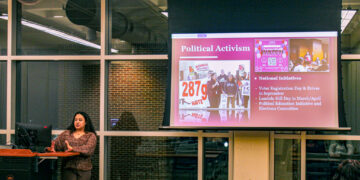
This story was updated Sunday, February 2, 2020 with the memorial date.
A memorial service for Burson, will be held on Feb. 22 at the Paris Yates Chapel.
Public relations guru Harold Burson was a man built on a foundation of strong morals and a stronger work ethic, according to his family and colleagues.
Burson, former CEO of Burson-Marsteller and famed pioneer of modern public relations, died on Jan. 10 at 98 years old. His son Mark Burson, an instructional assistant professor, and other friends and co-workers, offered insight on the man who championed creativity and diversity in the industry.
“To understand my father as a public relations professional, as a father, as a friend (and) as a colleague, you have to appreciate where he came from,” Mark Burson said.
Born to a low-income, Jewish immigrant family in Memphis, Harold Burson inherited his notable qualities — like his compassion, intellectual curiosity and work ethic — from his parents. His mother was especially revered for helping African-American communities by buying clothes at low prices and selling them on credit.
Before enrolling at the University of Mississippi, Burson graduated high school at the age of 15 and worked as a junior worker for The Commercial Appeal in Memphis. Since he could not afford college, his employer contacted Ole Miss’s then-Chancellor Alfred Butts, who helped appoint Burson as the head of the Ole Miss News Bureau and as a correspondent for The Commercial Appeal. These two jobs sparked the start of his collegiate career.
Arriving on a hot summer day in 1936 after taking a Greyhound bus from Memphis to Holly Springs to Oxford, Burson found a welcoming community and a new home.
“Until he died,” Mark Burson said, “whenever anyone asked, ‘What are the keys to your success?’ (My father) would say, ‘That’s easy. My time in the army and the generosity of the University of Mississippi and giving me the opportunity to get an education.’”
Harold Burson was drafted the United States Army in 1943 during World War II. He was deployed for two years in Germany, the last 11 months of which he spent covering the Nuremberg trials for the American Forces Network.
“If I had to pick one characteristic vital to success in any field I know of,” Burson said in his commencement address to the Ole Miss graduating class of 1989, “it would be what we might call ‘the people factor’… The ability to relate to and work with other people.”
Besides being the first PR firm to create a dedicated research unit or to use an IBM mainframe computer, Burson-Marsteller was also one of the first agencies to hire African Americans and women in leadership positions.
“He said everybody has the right to a voice,” Mark Burson said. “I don’t think he ever uttered the word ‘diversity,’ but he believed we had to open up the tent here, and we had to create pathways to bring all kinds of people into this business.”
Vic Han, a former employee and client of Burson-Marsteller, recalled his time searching for a job after graduating college in 1972. He said Burson-Marsteller’s demonstrated a dedication like no other agency to recruiting young talent, being one of the only agencies to hire people straight out of college without working experience.
“They wanted them young because they were energetic,” Han said, “and public relations is something that you can learn. That was really one of the factors that I think helped Burson-Marsteller go … to number one.”
Steve Parrish, a friend of Burson and former senior vice president for corporate affairs of tobacco giant Altria, said that Burson left a legacy that valued open, honest relationships with the public. Parrish said he based all of his relationships, professional and personal, on honesty and integrity.
“He proved that nice guys finish first,” Parrish said, “He was a kind counselor and mentor to so many people, and I considered him to be a role model.”
Reminiscing on times when he and Burson would visit a restaurant near the Burson-Marsteller offices, Parrish said all of the staff would always know Burson.
“They smiled when they saw him because he was as nice and considerate to them as he was to me or anybody else,” Parrish said. “And that was just Harold. He was a wonderful person, which is one of the reasons I always looked forward to getting together with him.”
Growing up, Mark Burson did not know that he would have not only end up in the same field as his father but also teach at the same university that he attended.
Mark Burson wanted to become an art director, but after graduating from the University of Southern California, his father eventually convinced him to continue his studies in the School of Journalism’s masters program in public relations.
After moving his oldest daughter in for her freshman year at the University of Mississippi, Mark Burson became enamored with the campus just like his father and began considering pivoting to teaching.
“I used to think that I chose Oxford,” he said. “And then my father passed, and I realized I didn’t choose this place. I realized God sent me here to be among such a great community … he passes and I find myself in the best place to be able to handle that.”



























